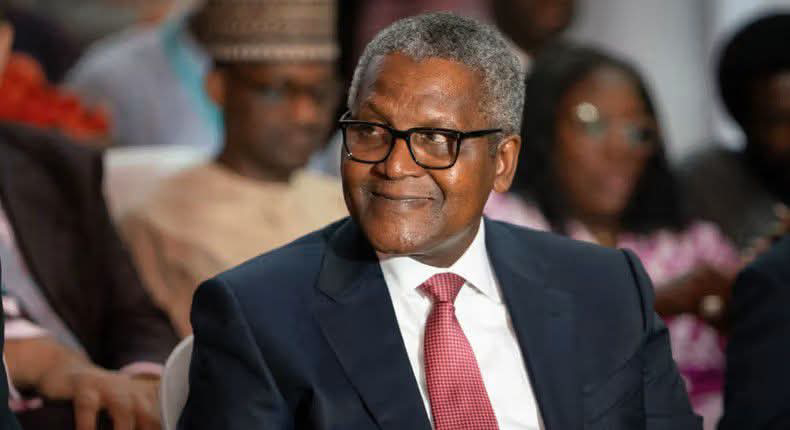Aliko Dangote, the President of the Dangote Group, has voiced significant doubts about whether Nigeria's state-operated refineries in Port Harcourt, Warri, and Kaduna will ever resume operations.
During a Thursday visit by the Global CEO Africa delegation from Lagos Business School to the Dangote Petroleum Refinery in Lekki, Lagos, the billionaire industrialist criticized Nigerian National Petroleum Company Limited (NNPC) for its inability to make refineries operational despite substantial financial investments.
Dangote highlighted that government-operated refineries have expended around $18 billion yet failed to deliver any significant results. In comparison, he stated that his privately constructed refinery, which has a capacity of 650,000 barrels per day, dedicates over half its output to the production of Premium Motor Spirit (petrol). This is in stark contrast to the government's refineries, which only achieved about 22 percent efficiency.
Dangote recalled the unsuccessful effort to privatize the facilities during former President Olusegun Obasanjo's administration, which was later overturned under the leadership of late President Umaru Musa Yar'Adua.
He explained, "Previously owned by Nigeria, the refineries we purchased were processing around 22 percent of PMS. We acquired them in January 2007 but had to return them to the government due to a change in administration."
"The managing director at that time persuaded Yar'adua that the refineries would become operational. They mentioned they were given to us as a kind of farewell gift or something like that. To date, around $18 billion has been spent on these refineries, yet they are still not functioning. I am doubtful and highly skeptical about whether they will ever work," he added.
He compared the current efforts to revamp the outdated refineries to trying to upgrade a decades-old car with new technology.
"(The turnaround maintenance) is akin to attempting to modernize a car built 40 years ago, when technology and everything else have evolved significantly. Even if you replace the engine, the vehicle's body won't be able to handle the impact of such new technological advancements," Dangote clarified.
His remarks echo previous criticisms from former President Obasanjo, who last year also raised doubts about the viability of the refineries. Obasanjo noted that the NNPC did not have the capacity to manage them and remembered how international oil companies like Shell had refused his request to take over these facilities.
"I rushed to Yar'Adua and told him, 'You know this isn't correct.' He replied, 'Well, NNPC claims they can manage it.' I countered with, 'NNPC can't do it,' and informed my successor that the refineries wouldn't function properly based on what I've heard and know. Furthermore, when you try to sell them as scrap for $200 million or more later on down-the-road – no one will be interested in buying." Obasanjo remarked illustrating our current dilemma perfectly once again evident today explicitly!
"Why do we put ourselves through such situations? The NNPC was aware of its limitations, yet it chose to partake in and perpetuate the corruption within. When capable individuals were present, they faced undue pressure. In a civilized society, those responsible would be held accountable and face imprisonment," he commented.
Earlier this year, Obasanjo restated his position by saying: "I was informed not long ago that more than $2 billion has been wasted on the refineries since then, and they still aren't operational."
"If a company like Shell provides me with the information they did, I will trust them. Therefore, if someone claims that the refinery is operational now, why are they partnering with Aliko Dangote? Aliko will not only make his refinery function but also ensure it delivers results."
He wrapped up with a Yoruba proverb, highlighting the contrast between exaggerated promises and reality: "They say that after someone has harvested 100 heaps of yams, they will also have 100 heaps of lies. You know what that implies."
In recent months, there has been increasing pressure on the Federal Government to privatize refineries managed by NNPC due to ongoing breakdowns despite official assertions of their revival. The Port Harcourt refinery, which allegedly restarted operations late last year, was closed again within six months. Similarly, the Warri refinery stopped functioning just a month after being proclaimed operational in December by former NNPC Group CEO Mele Kyari.
The Manufacturers Association of Nigeria, along with various energy sector stakeholders, have labeled the refineries as a financial burden and advocated for their sale. Some crude oil refiners have gone so far as to suggest selling them as scrap and using the proceeds to fund modular refinery projects instead.
Even with repeated allocations of public funds, the refineries continue to be inactive. In 2021, the government allocated $1.4 billion for Port Harcourt's refurbishment, $897 million for Warri, and $586 million for Kaduna. That year alone also saw N100 billion spent on refinery maintenance at a monthly rate of N8.33 billion. Furthermore, between 2013 and 2017, an additional $396.33 million was designated for turnaround maintenance efforts.



Post a Comment